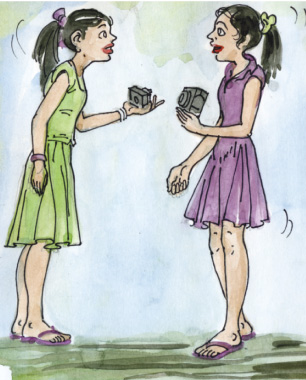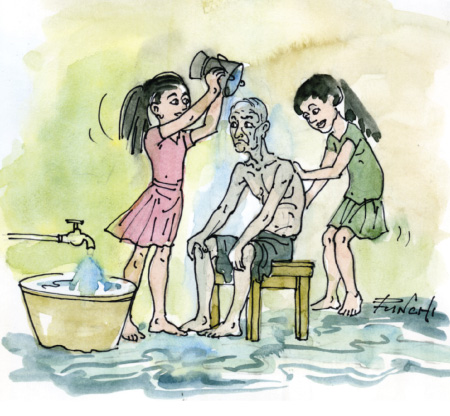|

by R. S. Karunaratne
How to use 'one' and 'ones'
We use 'one' instead of repeating a countable noun mainly in speech.
A: What sort of house are you looking for?
B: A small one.
 |
|
A: Which dog do you prefer?
B: The black one. |
A: What sort of car would you buy?
B: A big one.
That's a beautiful song. Would you sing another one?
You threw a great party yesterday. Let's have another one.
Your camera isn't as good as my one.
My gas cooker is broken. I have to buy a new one.
She has finished eating her apple. Ask her if she wants another one.
I don't like the green shirt. Give me a blue one.
A: Have another piece of cake.
B: OK. I'll have just a small one.
A: I'm going to buy the glass table.
B: But I like the wooden one.
I prefer the small house to the big one.
A: Which dog do you prefer?
B: The black one.
A: Which flower do you like?
B: The red one.
A: Is there a dispensary near here?
B: There's one in Main Street.
I already have a laptop. I don't need another one.
You have a new bicycle, but I haven't got even an old one.
A: Why don't you buy a car?
B: Yes, I'm going to buy one.
 |
|
Your camera isn’t as
good as my one. |
A: Do you have a camera?
B: No, I don't need one.
Ones
'Ones' is the plural form of 'one,'
A: Which are your books?
B: The ones on the table.
Amanda bought a blue shirt and two green ones.
Some people don't like brown shoes. They prefer black ones.
I don't like wooden spoons. Give me a few plastic ones.
I'm going to buy some fresh eggs. The ones I bought last week are
rotten.
Here are some flowers. Put the ones with stems into a vase.
A lot of women come to Martha's shop, but she doesn't like the ones
with short hair.
Bring some more apples. The ones you brought last week are over.
Match words and meanings
Here's an exciting way to enrich your vocabulary. Match the words in
Column A with their meanings in Column B and check your answers with the
key. The first one has been done for you.
[Column A]
Y 1. dessert
... 2. destabilise
... 3. destination
... 4. destined
... 5. destiny
... 6. destitute
... 7. destroy
... 8. destroyer
... 9. destructive
... 10. desultory
... 11. detach
... 12. detached
... 13. detachment
... 14. details
... 15. detailed
... 16. detain
... 17. detect
... 18. detective
... 19. detente
... 20. deter
... 21. deteriorate
... 22. determine
... 23. detest
... 24. dethrone
... 25. detonate
[Column B]
A. intended for a particular purpose
B. wanting to cause damage
C. separated
D. a group of soldiers separated from the main group
E. information about someone or something
F. the place where someone is going
G. giving a lot of information
H. an improvement in the relationship between two countries
I. to prevent someone from doing something
J. the things that will happen in the future
K. to become worse
L. to hate someone or something very much
M. to make a government lose its power
N. without money, food, a home or possessions
O. a small fast military ship
P. to separate something from something else
Q. to discover something
R. to make a strong decision
S. to remove a king or queen from their position
T. to explode
U. someone whose job is to discover information about a crime
V. to force someone officially to stay in a place
W. without a clear plan or purpose
X. to damage something very badly
Y. sweet food eaten at the end of a meal
Key:
2. M 3. F 4. A 5. J 6. N 7. X 8. O 9. B 10. W 11. P 12. C 13. D 14. E
15. G 16. V 17. Q 18. U 19. H 20. I 21. K 22. R 23. L 24. S 25. T
Starters:
Adjectives used with 'the'
We use some adjectives with 'the' to talk about groups of people in
society.
We should understand the talents of the disabled.
 |
|
The young should look into the needs of
the elderly. |
There is a school for the blind at Ratmalana.
The rich can afford to pay more taxes.
The young are usually boisterous.
Doctors and nurses take care of the sick.
We should always realise the plight of the disadvantaged.
Does anyone know the exact figures of the homeless in Sri Lanka?
The philanthropist made a generous donation of dry rations for the
hungry in Ethiopia.
The government has taken measures to ameliorate the conditions of the
poor.
Food should be made available to the starving.
The strong should not trample the rights of the weak.
The underprivileged are usually found in the rural sector.
The deaf cannot hear or talk.
We should respect the dead.
The handicapped should not be looked down upon.
Democratic rights are mainly for the living.
The elderly consist of a major section of society.
The young should look into the needs of the elderly.
The old should be paid a monthly pension.
The over-sixties are sometimes gainfully employed.
The under-fives do not understand the gravity of life.
Sometimes, you can use an adverb before the adjective.
The severely disabled need full-time care.
"The young" means "young in general."
The young have their own dreams and aspirations.
When we talk about a specific person in a group of people, we use
'man, woman" or "people."
A young man came to see me today.
I know the young woman standing there.
Many of the young people were involved in riots.
Some of the young men at the youth club are difficult to deal with.
Quiz on idioms
An idiom is a special kind of phrase. It is a group of words which
have a different meaning when used together from the one it would have
if the meaning of each word were taken individually. Tick the meaning of
each idiom in bold and check your answers with the key.
1. If your ideas are laughed out of court ...
(a) people do not consider your ideas seriously
(b) people consider your ideas seriously
(c) people have different ideas about you
2. If you are sent to Coventry ...
(a) you are sent to jail
(b) other people respect you
(c) other people ignore you
3. If you describe something as a sacred cow ...
(a) you support the majority view
(b) you disapprove of the fact that people are not willing to change it
(c) you respect an idea or tradition
4. If you do something until the cows come home ...
(a) you do it for a very long time
(b) you do it for a short time
(c) you do it quickly
5. If you wake up at the crack of dawn ...
(a) you wake up in the afternoon
(b) you wake up very late in the morning
(c) you wake up very early in the morning
6. If you have a crack at something ...
(a) you try to do something difficult
(b) you try to do something easy
(c) you do not want to do it
7. If you get cracking ...
(a) you get angry
(b) you start doing something slowly
(c) you start doing something quickly
8. If something happens from the cradle to the grave ...
(a) it happens for a short time
(b) it happens throughout a person's life
(c) it happens during your childhood
9. Creature comforts are ...
(a) modern facilities for sleeping, eating and washing
(b) luxurious living
(c) comforts made available to animals
10. If you are on the crest of a wave ...
(a) you are very successful
(b) you are very unsuccessful
(c) you are in a dangerous situation
Key:
1. (a) 2. (c) 3. (b) 4. (a) 5. (c) 6. (a) 7. (c) 8. (b) 9. (a) 10.
(a) |

